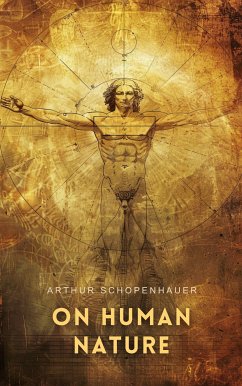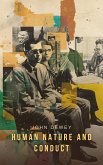"e;On Human Nature"e; by Arthur Schopenhauer is a profound exploration of the fundamental aspects of human existence and the complex nature of our being. In this insightful work, Schopenhauer delves into the depths of human nature, offering profound insights into our desires, motivations, and the intricate interplay between reason and instinct. Drawing upon his keen observations and deep philosophical inquiry, Schopenhauer analyzes the inherent contradictions and tensions within human nature. He scrutinizes the complex dynamics between the rational mind and the irrational forces that drive our behavior, shedding light on the inner workings of human psychology and the often-conflicting aspects of our character.
Dieser Download kann aus rechtlichen Gründen nur mit Rechnungsadresse in A, B, BG, CY, CZ, D, DK, EW, E, FIN, F, GR, HR, H, IRL, I, LT, L, LR, M, NL, PL, P, R, S, SLO, SK ausgeliefert werden.









